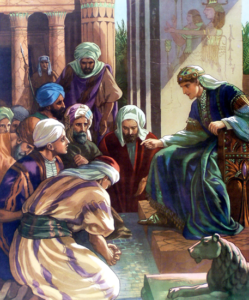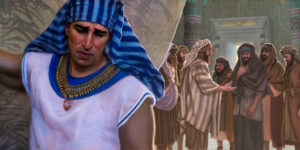The Brothers Took the Gifts and Benjamin to Egypt,
Then They Presented Themselves to Joseph
43: 15-34
The brothers took gifts and Benjamin to Egypt, then they presented themselves to Joseph DIG: Why do you think Joseph takes his brothers home and has a meal with them? How will their fear help Yosef complete his plan? Why do you think Joseph chooses not to reveal himself to his brothers, even at the moment of greeting Benjamin? What more does Joseph want? How did Joseph foreshadow the life of Christ?
REFLECT: Where is the cupboard bare in your life? And where are you feasting five times as much as anyone else? When have you been spiritually lulled to sleep, only to find yourself in a time of testing?

So Israel’s sons took the gifts and doubl the amount of silver, and Benjamin also. They hurried down to Egypt and presented themselves to Joseph (43:15). It is interesting to note that Benjamin does not speak during this entire ordeal.663 We can only imagine Joseph’s emotion when he saw Benjamin standing before him. He realized that his brothers had fulfilled their part of the agreement; he said to the steward of the house: Take these men to my house, slaughter an animal and prepare dinner. They are to eat with me at noon, which was the main meal of the day (43:16). The rabbis teach that this was a test. Yosef wanted to see how they behaved towards Benjamin and whether they would display envy when he gave him larger portions than the rest. Joseph’s actions parallel those of the father in Jesus’ parable who, on the return of his prodigal son, gave orders to bring the fattened calf and kill it. Let’s have a feast and celebrate (Lk 15:23).
The steward did as Yosef told him and took the men to his house. There were probably very few living souls that were granted the privilege of eating with Yosef, let alone at his house, but instead of being grateful, they were anxious. Now Joseph’s brothers were frightened when they were taken to his house. They couldn’t imagine that he was bringing them there for any good reason. They felt guilty about everything and said to themselves: We were brought here because of the silver that was put back into our sacks the first time. Notice what Joseph’s brothers feared: He wants to attack us and overpower us and seize us as slaves and take our donkeys (43:17-18). This was precisely what they had done to Yosef, and now that was what they feared for themselves. Paralyzed by guilt, they feared the worst, when Joseph, motivated by grace, was planning the best.664
So, in hopes of averting disaster, they went up to Joseph’s steward and spoke to him in Hebrew at the entrance to the house. They wanted to state their case while they were still outdoors. They volunteered a lot of information that had not been solicited when they said: Please sir, we came down here the first time to buy food.665 They were defending their honor even before they entered the courtroom.666 But at the place where we stopped for the night we opened our sacks and each of us found his silver – the exact weight – in the mouth of his sack. So we also brought it back with us. No accusations had been made against them, but they continued. We have also brought additional silver with us to buy food. We don’t know who put our silver back in our sacks the first time (43:20-22).
Standing at the door to Yosef’s house, the Egyptian steward said to them, “Peace be to you,” or shalom. And their fear must have turned to amazement when he said: Don’t be afraid. Your God, the God of your father, has given you treasure in your sacks; I received your silver. The Steward was saying, “Legally, you have nothing to worry about. As far as I am concerned, the money for the first sale of grain has already been received in full and I have absolutely no claims against you.”667 Then he brought Simeon out to them (43:23). The Scriptures do not record any conversation or celebration between Simeon and his brothers; apparently, because of the witness of Yosef, his steward had become a believer in the God of Abraham, Isaac and Jacob. Joseph had probably confided in him and he knew what was going on to some extent.
The steward took the men into Yosef’s house, gave them water to wash their feet, which was the custom of the day, and provided fodder for their donkeys. They prepared their gifts for Joseph’s arrival at noon, because they had heard that they were to eat there. When Yosef came home, they presented to him the gifts they had brought into the house, and they bowed down before him to the ground (43:24-26). This was the fulfillment of his dreams.
Joseph begins his exchange with his brothers with common courtesy, asking them how they were, and then he said: How is your aged father you told me about? Is he still living (43:27)? This would have been a highly irregular question, coming from a Prime Minister to “unclean” Jewish shepherds. What would the Prime Minister of the most powerful nation in the world care about a single, elderly, poor Jewish shepherd? Especially when the sons of that very shepherd were being “questioned” about spying? Was Joseph trying to give his brothers a hint? They replied: Your servant our father is still alive and well. And they bowed low. Once again, they were not merely respectful, but they were falling all over themselves trying to pay him honor (43:28).
As he looked about and saw his brother Benjamin, his own mother’s son, he asked: Is this your youngest brother, the one you told me about? He does not know for certain because Benjamin was only about two when Yosef was taken down to Egypt. And Joseph spoke tenderly to Benjamin, saying: God be gracious to you, my son (43:29). But he could no longer control his emotions.

Deeply moved at the sight of his brother, Joseph hurried out and looked for a place to weep there. After twenty-two years he finally saw his younger brother Benjamin. He had been only about two years old when Yosef was sold into slavery, so it was almost like seeing him for the first time.668 Joseph was thirty-nine at this time, and Benjamin was about twenty-four. Although Yosef was deeply moved, he did not reveal himself to his brothers at this time. After he had washed his face, he came out and, controlling himself, said: Serve the food (43:30-31) and if the brothers had not been so frightened, they would have noticed some subtle clues. First, Joseph did not eat with the Egyptians.
They served him by himself, the brothers by themselves, and the Egyptians who are with him by themselves, because Egyptians could not eat with Hebrews, for that was detestable to Egyptians (43:32). The Egyptians considered all foreigners unclean. Normally, no Egyptian would consent to kiss a Greek, or to use any utensils that belonged to one, or to eat the flesh of any animal that had been cut by a Grecian knife. This was because foreigners ate animals that the Egyptians regarded either as unclean or sacred. The Hebrews, for example, slaughtered and ate the cow, which was sacred in the eyes of the Egyptians. For this reason the representatives of the two nations could not eat together. They might have thought that the Egyptians did not eat with him because he was the head of the household and they were servants, but there was another clue.669
The men had been seated before him in the order of their ages, from the firstborn to the youngest; and they looked at each other with astonishment (43:33). Since they had all been born within the space of seven years with Leah, Rachel, Bilhah and Zilpah, he could not have recognized the order of their birth from their appearance. Who set the place mats? One can easily show (merely by multiplying together all the numbers from one through eleven) that there are no less than 39,916,800 different orders in which the eleven brothers could have been seated. Thus, for the servants to select the one correct order by chance was almost impossible. The odds were 40 million to one against it.670 The mysterious accuracy of their seating would only increase their uneasy sense of divine intervention.671
69. Both Joseph and Yeshua were made known to the children of Isra’el on their second visit. On their second visit, Joseph told his brothers who he was (see the commentary on Acts, to see link click Aw – Stephen’s Testimony to the Sanhedrin) .This will also be true of the Lord Jesus. The first time He appeared to the children of Isra’el, He was not recognized. He came to that which was His own, but His own did not receive Him (John 1:11). But at the Second Coming, they shall accept Him as their Leader and King. There are eighty ways that the life of Joseph would prepare the Jews for the coming of Jesus Christ (see the commentary on Genesis Iw – The Written Account of the Generations of Jacobs).
Then the Egyptian servants, on Yosef’s orders, did another odd thing. When portions were served to them from Joseph’s table, Benjamin’s portion was five times as much as anyone else’s as part of the test (43:34a). He is clearly the favored one, just as once the brothers had been jealous of Yosef because of his special favor and coat of many colors (37:3). So Joseph gave the youngest five times as much to eat as the rest of them to test their reaction. Why would Benjamin be favored? Was Joseph trying to send his brothers a hint? Would they now be jealous of Benjamin because of special treatment? Had they changed, or not? This is what Joseph wanted to find out.
Coming out of the famine of Canaan, the brothers passed this test as they feasted and drank freely with Benjamin without any signs of jealousy (43:34b). Ironically, the brothers sat down to eat a meal after they had thrown Joseph into a pit (37:25). They had callously eaten while Joseph was in despair, but now Yosef used the meal to entrap them. He lulls them into thinking there is no more danger; however, although Joseph was close to being satisfied with their attitude toward Benjamin, there is one more test to come. The silver cup used in the next chapter would provide one last opportunity for them to reveal any jealousy they might still be harboring.672



Leave A Comment